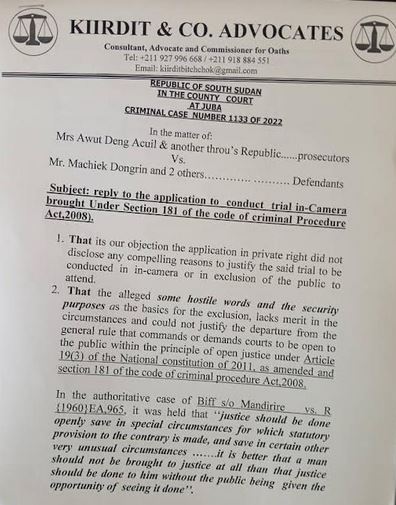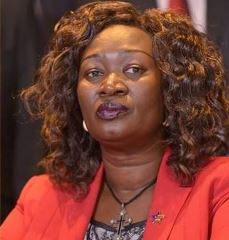Juba County Court Grade One Magistrate Lual Cuei on Tuesday adjourned the trial of a defamation suit filed by Education Minister Awut Deng Acuil to Thursday, 17 October.
In February 2021, a group of the Luanjang Community youths represented by the interim chairperson, Marcelo Deng Magon, wrote to President Salva Kiir accusing the Minister of barring the Primary Eight pupils from parts of Tonj East County from sitting the 2021 final examinations under the pretext of insecurity.
The Minister then filed a suit in a Juba court against Machiek Dongrin, Marcelo Deng Magon, and Tinjok Ruben Dhal, a medical student from the Bahr el-Ghazal University, in February 2022.
Last October, the Supreme Court referred the case against three youths representing the Luanjang Community of Tonj East County in Warrap State to the Juba County Court.
Kiir Chol Deng of Kiirdit and Co. Advocates, the defense counsel representing the three youths, told Radio Tamazuj after the court session that Monyluak Alor Kuol, the lawyer representing the complainant, Awut, had raised a motion during the previous session urging the court to conduct the hearing in camera yet the defense argued in favor of a public hearing.

He however said Judge Cuei rejected the defense’s application for a public hearing and proceeded with the hearing in camera. Chol said they will appeal the decision of the judge.
“We heard the matter today (Tuesday) but remember last time Awut`s lawyer filed an application asking the judge to hear the matter in camera, that is to exclude the public from attending the hearing,” he explained. “We replied today (Tuesday) and objected to that but the judge ruled in her (Awut’s) favor that the matter be heard in camera and the trial proceeded.”
“We heard Minister Awut and we could not cross-examine her because there was not enough time so the matter is adjourned up to 17 October when we are going to cross-examine her and we will also challenge that ruling because there was no reason at all to conduct the trial in camera,” he added.
Advocate Chol argued that South Sudan’s constitution is clear that the court is open to the public unless under specific circumstances which the plaintiff’s lawyer failed to prove to the court.
“They failed to convince us as to why they want the trial to be conducted in camera so we are going to challenge that decision to the High Court,” he stated.
According to the lawyer, the plaintiff’s lawyer wants the case to be heard in camera because he feels some of the words used in the case are “severe and will cause embarrassment to their client.”
“The allegations were that the defamatory statement was severe in a way that would embarrass the complainant if the matter is heard publically but we are saying that the matter was public so there is nothing here that can make the court hear the matter in camera,” Chol said. “We see that this is an unfair trial and we continue challenging that because there is no case at all. However, I do not want to talk more because the matter is still on trial. We made it clear that there is no ground for prosecution and that is our position.”




